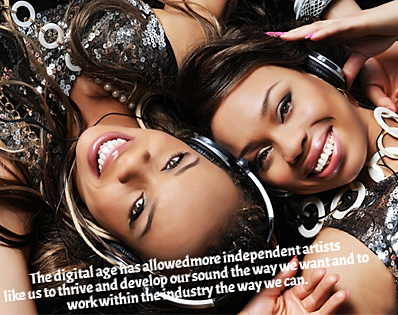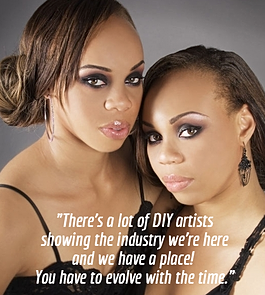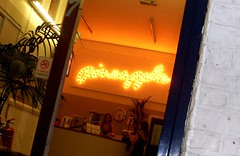Making music and breaking through
Selina Ditta interviews dance act duo Chidi and Chinwe of TOOCHI who have been riding the waves of the British music scene.
WITH THEIR HOT TRACK SOS (STYLE OVER SUBSTANCE) SPINNING IN THE CLUBS AND THE SIZZLING SUMMER SINGLE FIGHT FOR YOUR DREAM ON THE WAY, TOOCHI, (WHO YOU MAY HAVE SEEN ON SKY TV AT THE PINEAPPLE DANCE STUDIO) HAVE JUMPED IN TO THE DEEP END OF THE MUSIC INDUSTRY AND SURVIVED IN THE FIGHT FOR THEIR PLACE IN THE SPOTLIGHT.
I was so impressed with the spirit of the girls I had to get them to open up for A Creation’s readers.
Selina Ditta: So the new single is Fight For your Dream (FFYD) - what has been your fight? Tell us the journey!
Toochi: We have been fighting for our dream a while and it’s working! Just staying optimistic is a fight in itself…but we have each other to support when the chips are down. There are a zillion jobs to do in our record label and a lot of people to talk to so it can be hard work to keep on top of it all. But our biggest drive is to hear the songs come to life and perform them with our crew. It makes it all worthwhile when we see the end results.
We are promoting the album Play. It’s our way of telling ourselves: "We work hard and now we want to have fun, it’s time to play!" Our album Back to Front will be about the journey of how we began our career – we came out with big ideas and got our fingers burnt and we had to humble ourselves and now we have a better understanding of the whole spectrum of the official process and do things differently. We got ourselves in sticky situations in the past and that’s why we’re much more at ease now.
SD: What were the sticky situations? And what sort of sharks/charlatans/pitfalls have you come across? What should upcoming acts look out for and what lessons have you learned on your journey?
Toochi: We learnt the hard way that the industry can be harsh but you have to remember what your passion is and stay strong in yourself to live your passion even if everyone else tells you not to.
Sticky situation: dealing with sharks and being taken advantage of financially. We actually feel there needs to be more regulation in the industry – it’s taken us 15 years to learn to survive. There could be more to nurture young raw talent and look after those who are at such an innocent stage and eager to present what they’ve got only to realise people want to catch you out in a negative way. If you’re not resilient it’s a lonely place and we have each other for support through the dark times and when we hit dead ends.
SD: Who do you surround yourself with? Is it hard to trust people?
Toochi: We have wonderful family and good friends as resilient as us. They’re positive and supportive and keep us in check too. Our Toochi team are amazing and talented people who we’ve worked with over the years.
SD: How has Pineapple Dance Studio helped your career?
Toochi: Pineapple has been instrumental for our career as we trained there when we first started out years ago, allowing us to develop our dance/music skills. We originally came from the dance world so we were also able to meet and work with our teams that help give you TOOCHI today. We love the energy of dancing together and the discipline it instils - plus it’s also good for expressing what our lyrics say.
“
We have to be disciplined in learning all aspects (i.e. the business) of our craft to achieve the satisfaction of getting our expression (the music) out of it. The drive is getting people to hear the songs.
”
SD: From my understanding you have your own record label.
Toochi: Yes we operate our own label called T Records which allows TOOCHI music to travel from creative beginnings and end up in your iPod.
SD: So what goes into the record label?
Toochi: There’s so many jobs we have to forecast and lots of scheduling and juggling and map planning. It’s about being organised as well as creative. We have learnt so much – from making sure our video specs are right for broadcast – to getting our music to the right promoters and gig spaces and then working with production teams.
Some people we work with are not business savvy they just want to dance and sing and if you can find people you trust to do the business part for you that’s great. We do it interchangeably together – the business side allows the creative side to survive, it took a while for us to understand that. We have to only take on what we can manage as we are a small team. We have the single and the video and the album and we do want to expand to international markets so we have a plan that we’ll execute in phases so as not to crumble.
SD: How do you stay motivated?
Toochi: Always be convicted in your own vision. If we have a good song we get it out there, rather than deal with the politics of releasing it via a label. Our choreographer Mark Battershall really understands us; through the years we sustained dance injuries and industry setbacks. We’ve taken big risks but when you’re convicted in what you’ve got and you think it’ll benefit others – for example, to listen to your song and see others dancing to it and enjoying it is instant gratification. Music has been such a positive influence in our lives, a big tool to channel emotions and we just want to put back in what we’ve got out of it.
We get energy from seeing the end results, both of us dream up a concept or idea or melody then hear it, harmonise and record it on Dictaphones. We were having a jam session in the studio with our guitar player the other day and we are so happy when we are in our element and it makes everything worth it!
We get energy from seeing the end results, both of us dream up a concept or idea or melody then hear it, harmonise and record it on Dictaphones. We were having a jam session in the studio with our guitar player the other day and we are so happy when we are in our element and it makes everything worth it!
SD: How is the buzz around you created?
Toochi: You have to knock on a lot of doors to get your video shown and at the moment the buildings are all online so you have to push yourself forward. There is more scope and more reception for independent labels now – in the past, if you couldn’t get signed by a big record label like BMG, you weren’t considered an artist. But now you can make it happen without waiting for someone to tell you that you are an artist and the drive is to get our songs heard.
We’re known in the club circuit as an underground act – we’re so grateful for the DJs supporting I Represent and SOS – and SKY and Pineapple Dance Studio's support. If there is a buzz going on about TOOCHI then that’s very cool and we are very grateful for everyone who buys and enjoys our music.

SD: How do aspiring singers get to make professional videos and make names for themselves?
Toochi: By finding the video directors you want to work with and making that call. Be bold and believe in yourself. You can go for gold if you really want to.
The FFYD video was a labour of love. When you're trying to get your message across and everyone's passion, talent and energy were given 100% it came together with great results.
Financially it wasn’t easy. It’s a long process as we do live our lives and everyone in TOOCHI world has other jobs and work on their creativity on the side. While we’d love to have the funding we have made it work regardless and become business minded.
[youtube http://www.youtube.com/watch?v=CD_K_2d4Egc&w=560&h=315]
SD: What sort of messages are on the album? I've seen you tweet some inspiring lyrics?
Toochi: We like to offer empowering messages that can be applied to help our everyday lives. TOOCHI provides positive lyrics to inspire, encourage and acknowledge important things in life like family and having good friends. SOS is curently being promoted in the clubs up and down the country and we did have support from Capital Radio FM and KISS FM when it was first released. The 2013 release has been a great hit with DJ's who haven't forgotten TOOCHI! We're really excited about FFYD hitting the clubs for summer and the IBIZA scene!
SD: How do you decide to become a commercial act and how have you made it happen?
Toochi: A lot of hard work and dedication. We have always loved creating new songs and melodies so we played to our strengths and kept our music genre in that market place. There is a lot of talented people in team TOOCHI that we have been extremely fortunate to work alongside with so the level of talent we work with in TOOCHI is naturally reflected in our music and videos.
SD: You appeared in Coldplay and Robbie williams videos - how did it come about and is appearing in others' music videos a good way of networking in the music industry?
Toochi: Definitely! We threw ourselves out there to try as many jobs as possible as you get to meet the people in the industry and make your contacts. We went to Robbie’s for a laugh- as they were looking for Robbie William lookalikes but we still made the final cut! In the Coldplay video we were extras helping to create a spotlight effect. Chris Martin instantly recognised that we were identical twins when he spotted us! That was nice.
SD: You tweet inspiring messages a lot, also it seems your lyrics follow this. What is your working motto?
Toochi: Be who you are, believe in yourself and don't give up! You can do anything you put your mind to. Its messages we have had to live by that has helped us too in our music career.
SD: Anything else you'd like to add?
Toochi: TOOCHI would like to thank all our supporters, friends and family for sticking by us over the years. We are really excited about our musical path ahead and will continue to provide more TOOCHI tracks for our amazing fanbase. Grab yourself a FFYD T-Shirt and download the track Fight For Your Dream out on ITunes on June 14th!
Keep fighting for your dreams! Love TOOCHI XX





